How to Care for Your Orchid During the Winter
Introduction
Whether you’re nurturing your first orchid or are an experienced orchid enthusiast, the winter months can be challenging for your tropical plant. With colder temperatures and drier air, you may wonder how to ensure that your orchid stays healthy and vibrant. Fortunately, with a few simple adjustments, you can help your orchid not only survive but thrive through the winter and beyond.
Here are five essential winter orchid care tips that will benefit both beginners and seasoned growers during the colder months.
1. Adjust Your Watering Routine
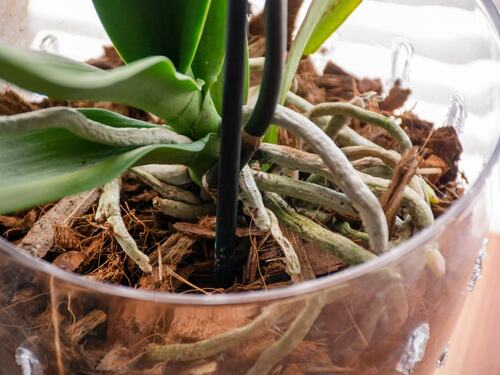
A Close-up of Orchid Roots
Understanding Winter Watering Needs
Orchids have specific watering needs that can change with the seasons. During winter, the standard practice of watering with three ice cubes per week might not be sufficient, particularly if your home’s dry heat accelerates the drying process.
How to Determine if Your Orchid Needs More Water
To ensure that your orchid is properly hydrated, check the condition of its roots. Healthy, well-watered orchid roots are typically plump and green. If you notice that the roots are starting to dry out or look less vibrant, it may be time to adjust your watering routine. Aim to provide just enough moisture to keep the roots healthy without overwatering, which can lead to root rot.
2. Manage Indoor Humidity Levels
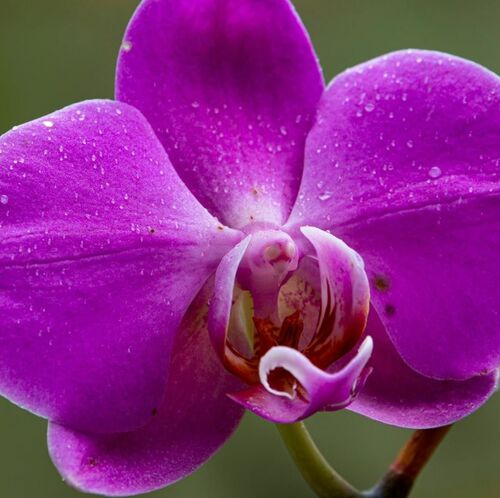
Orchid Petals Covered in Tiny Droplets – Photo by Marcelo Joaquim
Why Humidity Matters
Orchids thrive in a humid environment, and winter’s dry indoor air can be challenging for them. Maintaining appropriate humidity levels is crucial for your orchid’s health.
Tips for Increasing Humidity:
- Humidity Tray : Place your orchid on a shallow tray filled with pebbles and water. As the water evaporates, it will increase the humidity around the plant.
- Humidifier: Run a humidifier in the room where your orchid is located. This will help maintain a consistent level of moisture in the air.
- Bathroom Placement: If possible, move your orchid to a bathroom during winter. The increased humidity from showers can benefit your plant, but ensure that it still receives adequate natural light.
3. Ensure Adequate Sunlight
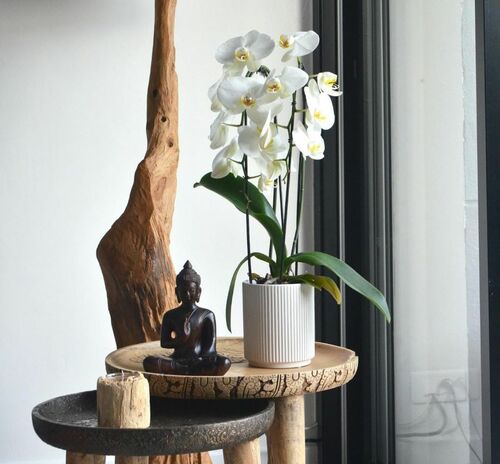
An Orchid Placed Next to a Window – Photo by Skylar Kang
Maximizing Winter Light
With shorter daylight hours and less sunlight during winter, your orchid might not be getting enough light. Proper lighting is essential for healthy growth.
Finding the Right Spot
Relocate your orchid to a sunny room where it can receive plenty of indirect natural light. Avoid placing it in direct sunlight, which can cause leaf burn. A bright, indirect light source will help your orchid continue to photosynthesize and stay healthy throughout the season.
4. Watch for Drafts
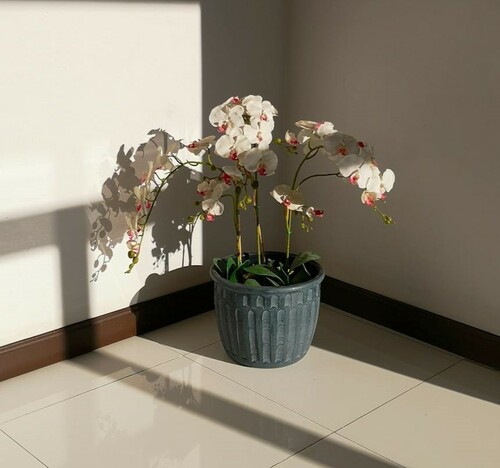
An Orchid in a Sunny Corner – Photo by weedlyr
Protecting Your Orchid from Cold Air
Winter heating can create drafts that may negatively impact your orchid.
Avoiding Temperature Fluctuations
Key Tips to Avoid Drafts:
- Relocate Your Orchid: Move your plant away from heating vents and drafty areas to ensure that it’s in a more stable environment.
- Check for Temperature Drops: Use a thermometer to monitor the temperature around your orchid. Aim for a consistent temperature between 60°F and 75°F (15°C and 24°C).
- Use Draft Stoppers: If relocating isn’t possible, use draft stoppers or weather stripping on doors and windows to reduce cold air intrusion.
By protecting your orchid from drafts, you can help maintain its health and ensure that it thrives throughout the winter.
5. Address Yellowing Leaves
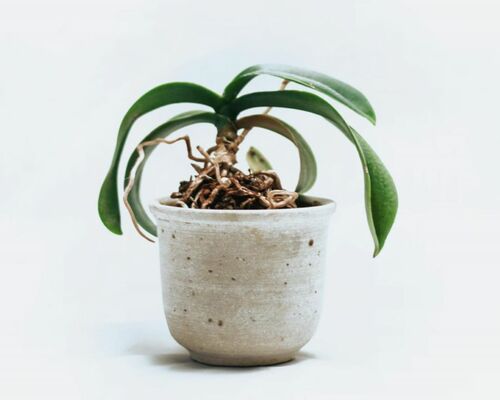
An Orchid Plant Without Flowers – Photo by Tom Swinnen
Yellowing leaves on your orchid can be a sign of stress, but it’s often something you can fix with a few adjustments. Sometimes, yellowing leaves are just part of the orchid’s natural life cycle, particularly with older leaves.
Common Causes:
- Insufficient Light: Orchids need plenty of indirect sunlight. If the leaves are yellowing, try moving your plant to a brighter spot with more indirect light.
- Watering Issues: Both overwatering and underwatering can cause yellow leaves. Check the roots—healthy ones should be firm and green. Adjust your watering schedule based on the moisture level of the potting medium.
- Nutrient Deficiencies: If your orchid isn’t getting enough nutrients, yellowing may occur. Use a balanced orchid fertilizer , diluted to avoid overfeeding, and apply it regularly.
Quick Actions:
- Relocate for Better Light: Move your orchid to a location with more indirect sunlight.
- Adjust Watering: Ensure that the roots are moist but not waterlogged.
- Fertilize Properly: Feed your orchid with a balanced fertilizer every two weeks.
By making these small adjustments, you can help your orchid maintain its health and vibrant green color.
Final Thoughts
By following these winter care tips, your orchid can not only survive but thrive during the colder months. With proper attention to watering, humidity, light, and temperature, your orchid will be well prepared to bloom beautifully come spring.
If you have any additional questions about indoor plant care , especially during winter, don’t hesitate to contact Arborist Now for expert advice and assistance!
Originally posted February 21, 2021.


